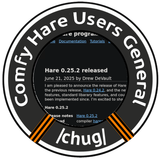Anonymous
6/24/2025, 10:53:01 AM
No.105688172
[Report]
>>105692300
>>105703525
>>105711732
>>105718979
>>105720245
>>105720799
>>105722666
>>105724649
>>105727036
>>105736390
>>105738080
>>105741403
>>105744020
>>105744061
/chug/ - comfy hare users general
The purpose of this General is to discuss Hare, Low level and also systems programming in general.
Hare is a successor to C. Therefore, hare users are experts on C. Because of that, questions and discussion about C are also welcome.
What is Hare?
>https://harelang.org
>Hare is a systems programming language designed to be simple, stable, and robust. Hare uses a static type system, manual memory management, and a minimal runtime. It is well-suited to writing operating systems, system tools, compilers, networking software, and other low-level, high performance tasks.
What does Hare bring to the table?
>Staying loyal to C ideal of simplicity while revamping the error handling, module system and the standard library
Other than that, Hare doesn't deviate from C that much unlike Zig, Rust, etc. That is why Hare is best used by seasoned C developers who do not dislike C, but have only minor nitpicks with C.
Don't know how to write Hare? Start here:
General documentation: https://harelang.org/documentation/
General language introduction: https://harelang.org/tutorials/introduction
Standard library: https://harelang.org/tutorials/stdlib
Tsoding's review: https://www.youtube.com/watch?v=2E3E_Rh3mvw [Embed] [Embed]
The flagship feature of Hare is the "Tagged Unions". C users who have used OCaml in the past will feel right at home!
type signed = (int | i8 | i16 | i32 | i64);
type unsigned = (uint | u8 | u16 | u32 | u64);
type integer = (...unsigned | ...signed);
Previous: >>105604073
Hare is a successor to C. Therefore, hare users are experts on C. Because of that, questions and discussion about C are also welcome.
What is Hare?
>https://harelang.org
>Hare is a systems programming language designed to be simple, stable, and robust. Hare uses a static type system, manual memory management, and a minimal runtime. It is well-suited to writing operating systems, system tools, compilers, networking software, and other low-level, high performance tasks.
What does Hare bring to the table?
>Staying loyal to C ideal of simplicity while revamping the error handling, module system and the standard library
Other than that, Hare doesn't deviate from C that much unlike Zig, Rust, etc. That is why Hare is best used by seasoned C developers who do not dislike C, but have only minor nitpicks with C.
Don't know how to write Hare? Start here:
General documentation: https://harelang.org/documentation/
General language introduction: https://harelang.org/tutorials/introduction
Standard library: https://harelang.org/tutorials/stdlib
Tsoding's review: https://www.youtube.com/watch?v=2E3E_Rh3mvw [Embed] [Embed]
The flagship feature of Hare is the "Tagged Unions". C users who have used OCaml in the past will feel right at home!
type signed = (int | i8 | i16 | i32 | i64);
type unsigned = (uint | u8 | u16 | u32 | u64);
type integer = (...unsigned | ...signed);
Previous: >>105604073











